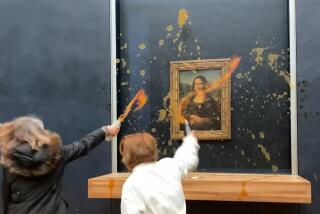Frohnmayer Sparks New Flap by Rejecting Grant : NEA: The chairman vetoes funds recommended by advisers. The objection may stem from the work’s perceived political content.
- Share via
WASHINGTON — John E. Frohnmayer, chairman of the National Endowment or the Arts, has for the first time rejected a grant that was recommended by a review panel and approved by the NEA’s advisory council. Some council members had criticized the project for being political in nature.
The veto stirred concerns among some members of the arts community who have been watching to see how the endowment will function after the protracted and bitter struggle over its reauthorization in the last session of Congress.
The proposed $10,000 grant would have funded “Revival Field,” a conceptual work by New York City artist Mel Chin, who intended to use plants “to remediate an area contaminated with heavy metals.” Rufus L. Chaney, a research scientist at the U.S. Department of Agriculture, was to collaborate on the piece, which was to be sponsored by the Houston-based Citizens Environmental Coalition. Chin, who in an interview was reluctant to elaborate on the project, said he was not certain it can be undertaken now.
Chin said the endowment’s letter of rejection stated that while Frohnmayer “understands that Mr. Chin is highly respected as an artist of excellence in his field, the chairman was not persuaded by the discussion of the project that the artistic aims as outlined in the application were sufficient to merit arts endowment funding.” Chin has had one-man shows at the Walker Art Center in Minneapolis and the Hirshhorn in Washington.
Frohnmayer could not be reached for comment over the Thanksgiving holiday. An endowment spokeswoman said the agency did not comment on grant rejections as a matter of policy.
Chin said he was disappointed with the chairman’s decision. “I suspect from the letter I received that the chairman does not comprehend the scope or artistic aims of this project,” he said. “I also view with suspicion the autocratic use of power on this veto, especially since there was a recommendation from a jury of my peers as well as the advisory panel.”
Jim Fitzpatrick, an attorney with Arnold & Porter and president emeritus of the Washington Project for the Arts, said he was unfamiliar with the grant in question but thought the veto was a “troublesome development.” He said he hoped the decision did not signal “a new offensive by the endowment” against works with political content.
“It seems to me that this is a curious decision by the endowment,” he said. “There are none of the normal grounds for concern that we’ve seen. This is far beyond any question of obscenity or decency standards. It deserves a careful look to see whether (the) endowment is simply shying away from matters of political controversy. Artistic excellence must be the sole central criterion, and political content or orientation isn’t appropriate grounds to deny funding.”
Frohnmayer has vetoed several potentially controversial grants during the past year. But he has consistently relied on the council’s recommendations. Currently, the arts community is waiting to see whether he will approve proposed grants to controversial performance artists Karen Finley and Holly Hughes. While Frohnmayer has vetoed earlier grants to Finley and Hughes, the council approved grants to them at its most recent meeting earlier this month.
At its August meeting, council member Joseph Epstein, a writer and editor who lectures at Northwestern University, cited the Chin proposal among 15 that in his view had a “political tone” and should not be federally funded. Council member Roy Goodman, a New York state senator, suggested that the Citizens Environmental Coalition was an inappropriate recipient of endowment funds. But Lloyd Richards, artistic director of the Yale Repertory Theater, argued that political objections were not “a valid basis for rejection.”
More to Read
The biggest entertainment stories
Get our big stories about Hollywood, film, television, music, arts, culture and more right in your inbox as soon as they publish.
You may occasionally receive promotional content from the Los Angeles Times.










